Vurdering af klinisk kompetence
7 måder, hvorpå SimCapture kan gøre din indsats endnu mere fordelagtig!
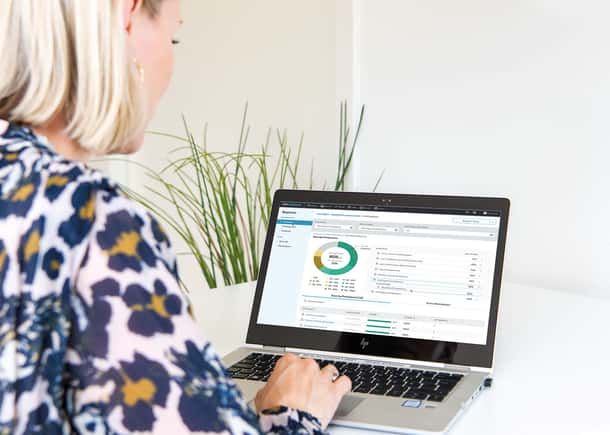
7 måder, hvorpå SimCapture kan gøre din indsats endnu mere fordelagtig!

If you’re reading this as a clinical educator—or if you serve as a dean or director of clinical education—you undoubtedly know the pride that comes from seeing your learners achieve career-level competency. Perhaps you are a teaching physician or a nurse educator or an instructor in pre-hospital care. There is a common winning attitude among clinical educators across all fields of care.
This winning attitude is especially apparent during clinical evaluations. Watching your learners perform and hoping that they score high is not unlike watching your favorite team or player take the field. High-stakes exams or low-stakes periodic reviews, are the moments that many clinical educators live for. Perhaps you’re one of them.
What we know you do not live for are the administrative, operational, and budgetary burdens that go with clinical assessments—things that can take some of the joy out of teaching. If you are not equipped to manage these tasks easily and efficiently, your main task of assessing learner competency can seem overwhelming.
Laerdal’s SimCapture system can solve these issues for you and give you back that sense of winning spirit that should come with clinical assessments. Below are 7 ways SimCapture can help!
Think of SimCapture as any other smart technology. SimCapture is a digitally based system that can serve as a central hub that enables you to manage, record, assess, and debrief all your simulation-based training. SimCapture combines software, course structure, and video capture capabilities to help you get the most from your simulation efforts. Gains you can achieve include operational efficiency, data collection and reporting, and better learner outcomes. All combined, SimCapture turns your sim center into a smart center.
For clinical educators especially, SimCapture promotes learner competency while allowing you to achieve objective, reportable, cost-effective results. SimCapture can be used with any simulator or a standardized patient. Laerdal LLEAP user, you will be able to gather and report even more data.
If you want your winning efforts in simulation to win even more, SimCapture can make all the difference.
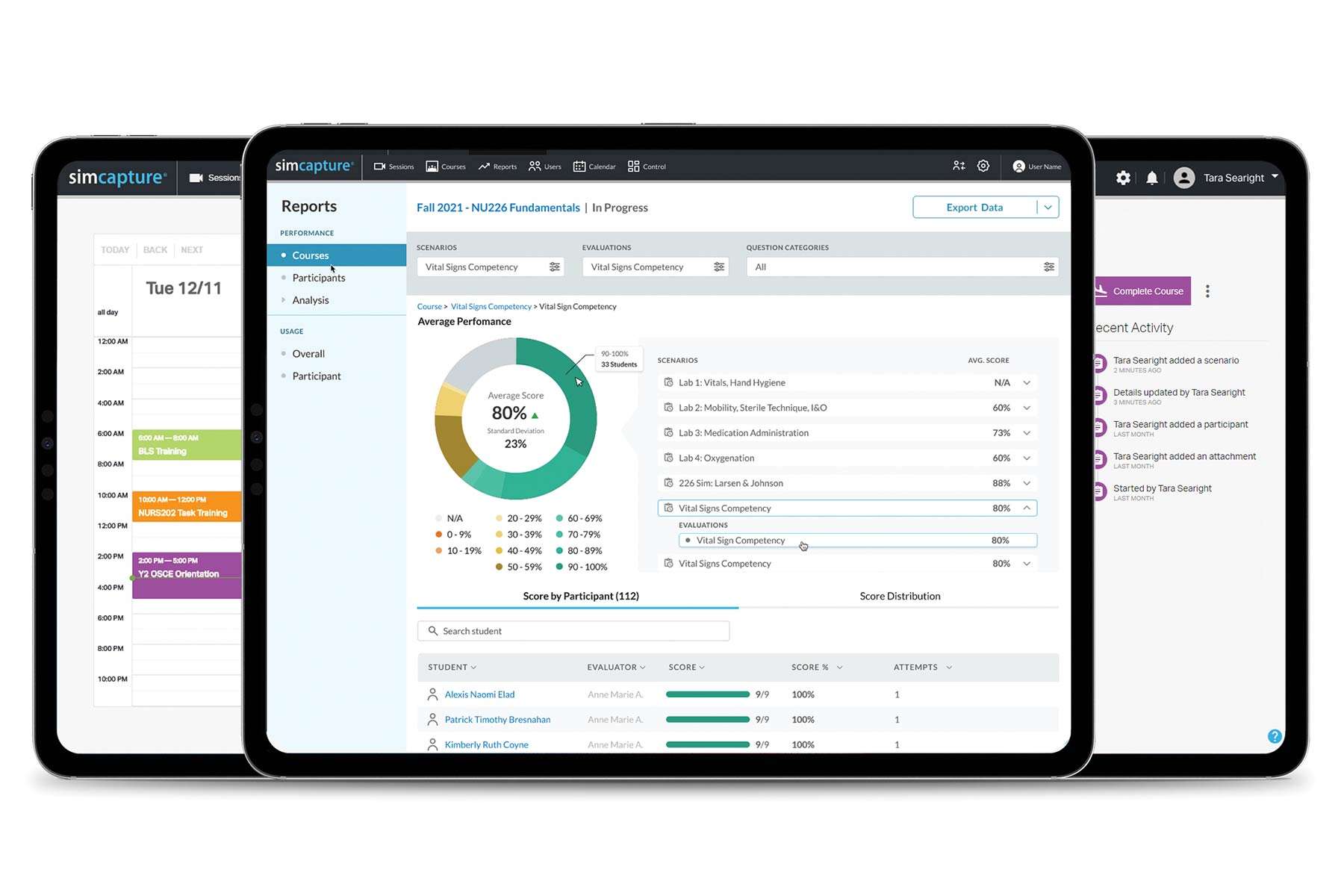
Ensuring objectivity is one of the foremost themes we hear about in performing assessments. Most clinical educators are concerned about it. Video plays an important role in this. Video ensures an unbiased evaluation for examiners and enables them to review learner performance multiple times, if necessary, rather than relying solely on memory or written notes. SimCapture offers a multi-camera view that gives clinical educators clarity, the ability to enter annotations on the fly, and the ease of targeted playback.
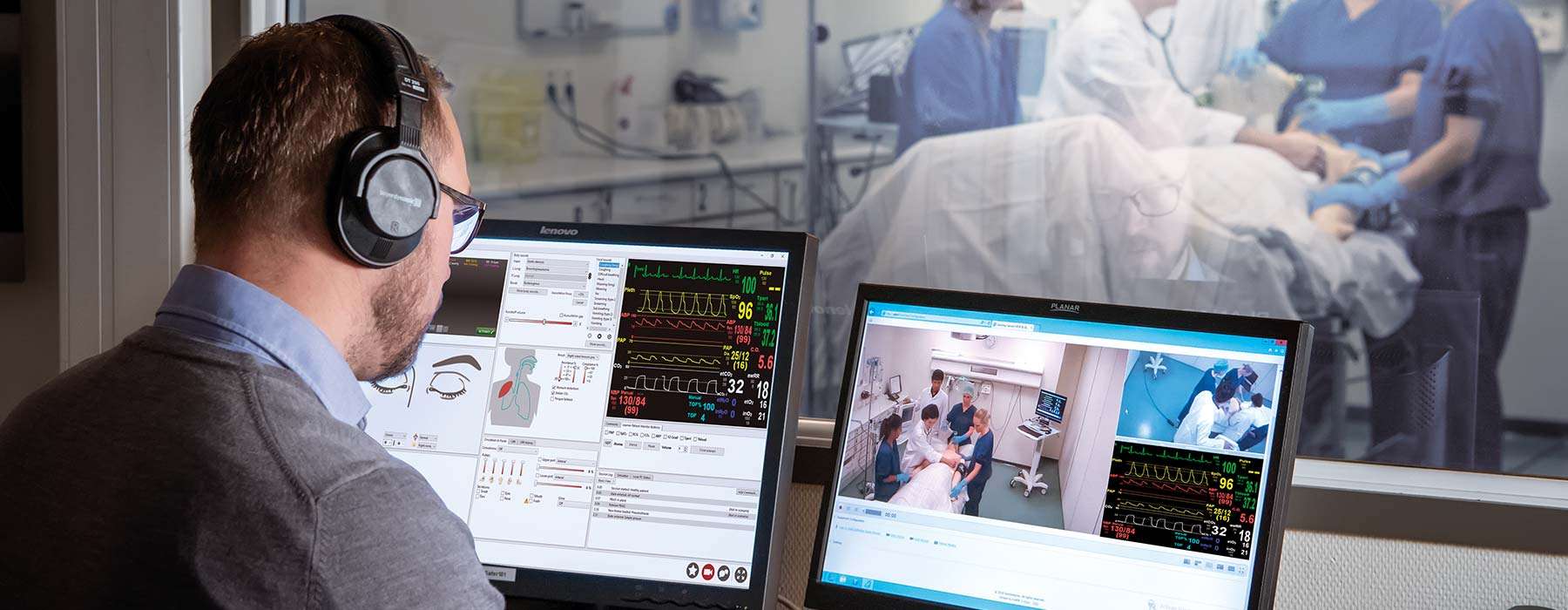
Patty Meyers Hill, Assistant Dean for Accreditation and Educational Support at Pace University's College of Health Professions

Are you collecting the results of your clinical assessments on paper? And are you finding yourself compiling all those results into spreadsheets or entering them into a central online repository, always under time pressure? Your learners and your administration are rarely patient!
SimCapture solves that problem by facilitating the collection of data on a real-time basis. Using SimCapture during assessments, you can capture video and evaluate as the scenario plays out. You can use your evaluation criteria to keep yourself on a standardized assessment path. Once a simulation is complete and your assessment is finalized, pressing “enter” is all it takes to submit the student’s results for your learners to review and for you to manage.
“Maybe it’s the scientist in me, but I like data and I want it to be very reliable,” says Patty Meyers Hill. “There was a time when people were keeping their own records and submitting it in different ways. Now [through SimCapture], we automate this and have it instantly available for everyone.”
Patty adds, “Many of our faculty have learned that this is the most efficient way to grade.”
Increasingly, clinical assessments are being used to provide feedback as formative assessments across a course of study. This is important for learners as they build their critical thinking skills and continue to develop the skills, attitudes, and performance patterns that lead to competency.

Nursing is a leading example, the American Association of Colleges of Nursing (AACN) advocates that assessments be conducted at multiple timepoints along a learner’s education. Their Guiding Principles for Competency-Based Education is a great resource for anyone pursuing the path of competency.
Patty Meyers Hill points out, “Some schools literally just give that [single] summative examination as a way of assessing competency. I mean, they obviously teach them throughout, but they don’t do those formative assessments… Formative assessments help students grow and I think they really appreciate it.”
The combination of video and rubric data provided by SimCapture enables clinical educators to pinpoint performance areas where feedback to learners is beneficial to their growth. Once they reach summative assessments like the OSCEs, they are then prepared to achieve their best!
For many, this is Win No. 1! SimCapture has a built-in feature that enables you to schedule any simulation. It works like how you would schedule a meeting through Teams, Outlook, or some other app. This becomes especially important during OSCEs and other high-stakes exams when simulation resources are at a premium and your simulation tempo is at its highest. You may find yourself competing for lab space, simulators, and time.
Standardized patients deserve special mention here. Standardized patients are in high demand and can be expensive. Scheduling them effectively may be critical to staying within your budget. Many SimCapture users appreciate that by using the scheduling feature in SimCapture, they have achieved a higher level of utilization of all their simulation assets, especially standardized patients.
If you are in a position of having to justify cost and utilization trends, SimCapture can make all the difference.
As a clinical educator, you may want to look at learner performance trends over time. Are there particular areas that seem problematic or have evolved to be challenging over time? Or is there a trend that seems to have impacted one cohort but no other? These are performance questions that the data collection and reporting functions within SimCapture can help you track and report on demand.
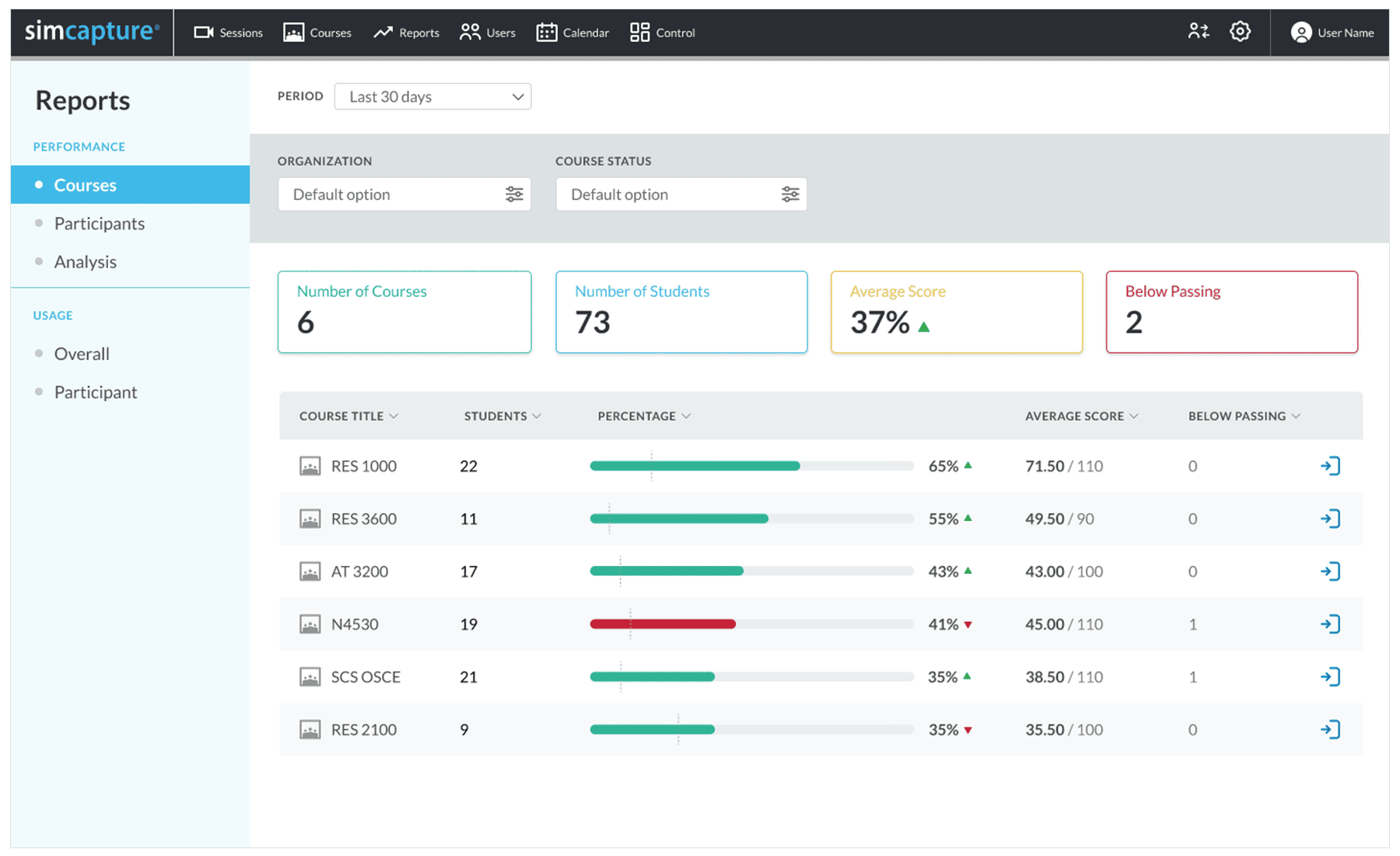
Patty Myers Hill relies on those functions. In her words, “...you can do an item analysis and if you know that 75% of a class didn’t ask [a patient] the right question or didn’t do a particular physical exam maneuver, this is information we can give back to the faculty to say, ‘You know, there’s kind of a disconnect here.’”
With SimCapture there is no need to backtrack through manual files or ask colleagues to do the same. All your assessment data is collected on an organization wide basis for you to easily access and manage.
The paradigm for assessing clinical competency is becoming increasingly rigorous. Globally, healthcare in all fields is moving to some form of competency-based education (CBE). This can be said of medicine, nursing, dentistry, pre-hospital care, and certainly the military. By contrast to traditional knowledge-based instruction which focuses on tests and graded assignments, CBE requires a learner to actively demonstrate their knowledge, skills, and behaviors that will equate to readiness to perform in their field.
SimCapture provides every tool you need to be able to assess your learners efficiently and consistently against the rubrics (competencies) you define. And the structure SimCapture creates signals to learners that their competency assessments should be taken seriously. There is something inspiring and confidence-building about preparing for a simulation that will be formally reviewed and which will produce the kind of professional feedback that SimCapture delivers as part of the regular pace of learning.
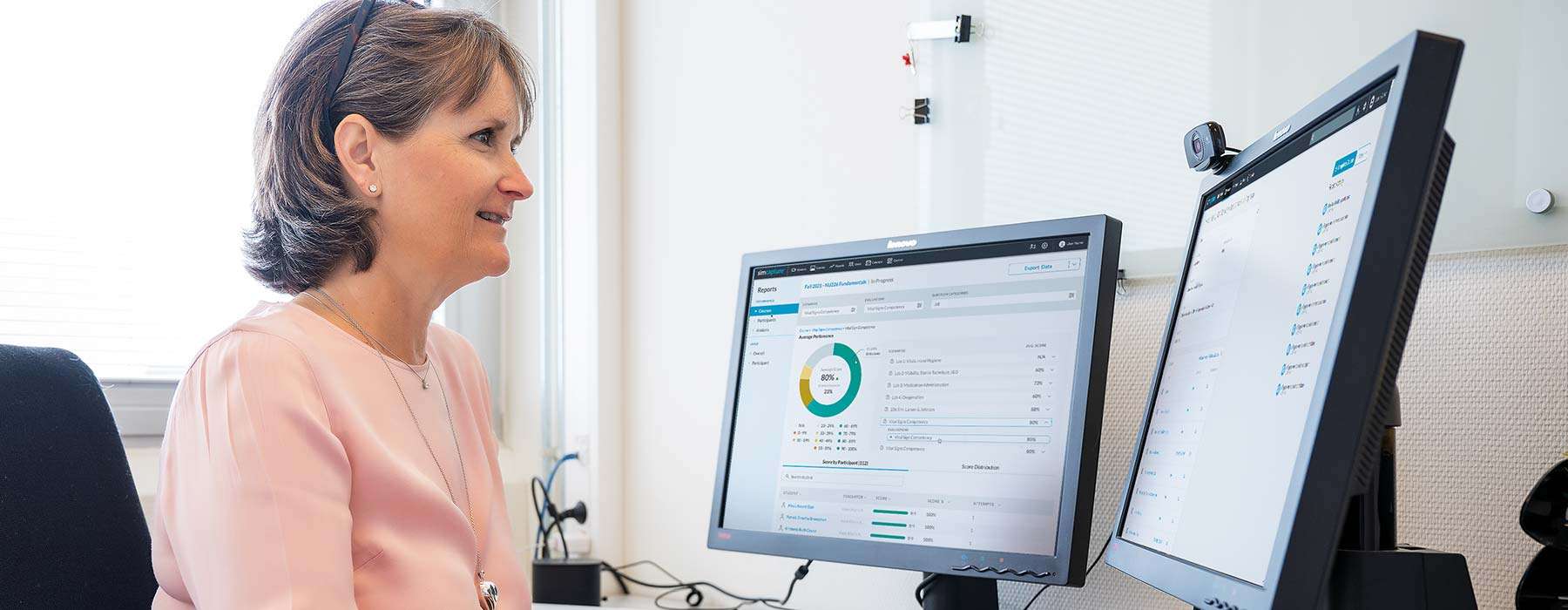
Accreditation agencies across healthcare are concerned with educational quality, continuous improvement, institutional culture, and uniformity of current standards—to name just a few. Having a system in place that can show reliability and uniformity to your clinical assessment approach can be important, if not critical. This ties into every win we have discussed so far.
SimCapture manages and reports data for you, it ensures objectivity, it aids in providing learner feedback, and it supports assessing human factors. The time and money it can save you is the result of better scheduling, the ability to track performance trends is the result of automated transparency, and bridging the gap between theory and practice is the result of having a better and uniform system.
Our experience is that even when clinical educators debate the theory behind clinical assessments, any frustrations expressed are about the mechanics behind the process, not the value of the results.
If you are disappointed in the process—or you just want to continuously improve your approach—let us help. Call your local Laerdal representative, or take advantage of other SimCapture resources.
Helping you assess and build clinical competency among your learners is part of our mission. Thank you for letting us help you.